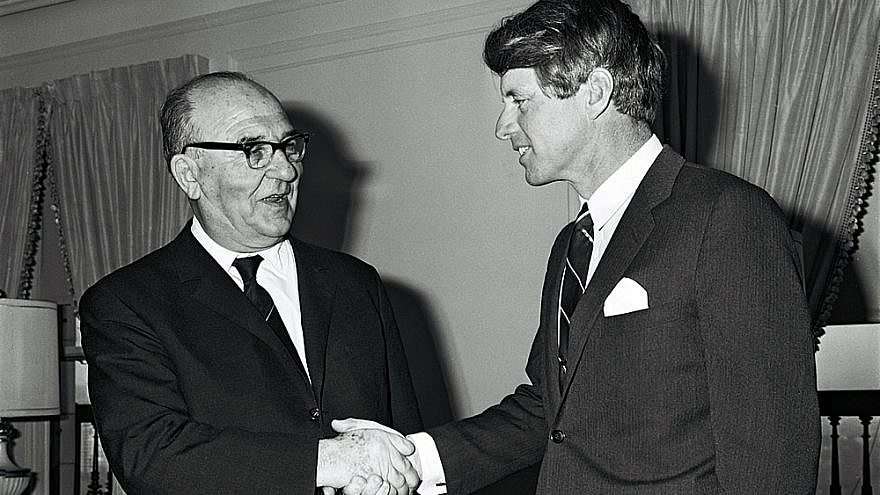Robert Kennedy was a champion of the Jewish state from the start of his professional life in 1948 until the tragic end of his life 20 years later in 1968. He served as the U.S. Attorney General in his brother John F. Kennedy’s presidential cabinet and as a U.S. senator from New York. “Bobby” Kennedy was an American liberal icon, fighting racial discrimination in the South and leading opposition to the Vietnam war.
Robert Kennedy’s foray into international affairs came shortly after he graduated from Harvard University in 1948, when he reported from war-torn British Mandate Palestine for The Boston Post. His father, Joseph, known for his anti-Semitic attitudes, opposed his son’s travel to report on the Jewish struggle for independence and survival. In The Boston Post, Kennedy wrote: “The Jewish people in Palestine who believe in and have been working toward this national state have become an immensely proud and determined people. It is already a truly great modern example of the birth of a nation with the primary ingredients of dignity and self-respect.”
After Kennedy rode in a Jewish convoy bringing supplies to Jerusalem, he wrote: “If the brief but victorious military engagement on the Tel Aviv-Jerusalem road had not taken place, the Jewish cause would have suffered such a setback as to be virtually lost. If the Haganah had waited for May 15th and the withdrawal of British troops, there would be few alive in Jerusalem today.”
The experience stayed with Kennedy. By 1968, as a senator and presidential candidate, he pressed U.S. President Lyndon Johnson to sell Israel 50 F-4 Phantom jets after the French froze the sale of Mirage planes following the 1967 Six-Day War. The Departments of State and Defense were opposed to the Phantom sale, worried that the arms transfer would break a policy of U.S. arms-sales neutrality.
On May 26, 1968, Kennedy told Congregation Temple Neveh Shalom in Oregon that “the United States must defend Israel against aggression from whatever source. Our obligations to Israel, unlike our obligations towards other countries, are clear and imperative.”
“The United States should, without delay, sell Israel the 50 Phantom jets she has so long been promised,” he declared. He repeated the message when he arrived in California.
A day later, Kennedy’s strong plea for the defense of Israel and his photo appeared in the Pasadena Independent. The article enraged a Palestinian named Sirhan Sirhan. He wrote in his diary, “Robert F. Kennedy must be assassinated before June 5, 1968.” That day was the first-year anniversary of the Six-Day War.
Shortly after midnight on June 5, 1968, Sirhan shot and killed Bobby Kennedy in the Ambassador Hotel in Los Angeles. The Pasadena Independent article was in his pocket.
“He was killed because of his support [for Israel],” stated his daughter Kathleen Kennedy Townsend, the eldest of 11 children born to Kennedy and his wife, Ethel.
America lost a blazing star, Israel lost a strong friend, and the United States shed its first blood from Palestinian terrorism. Within months after Kennedy’s murder, the U.S. government approved the sale of 50 Phantom and 100 Skyhawk aircraft to Israel.


























